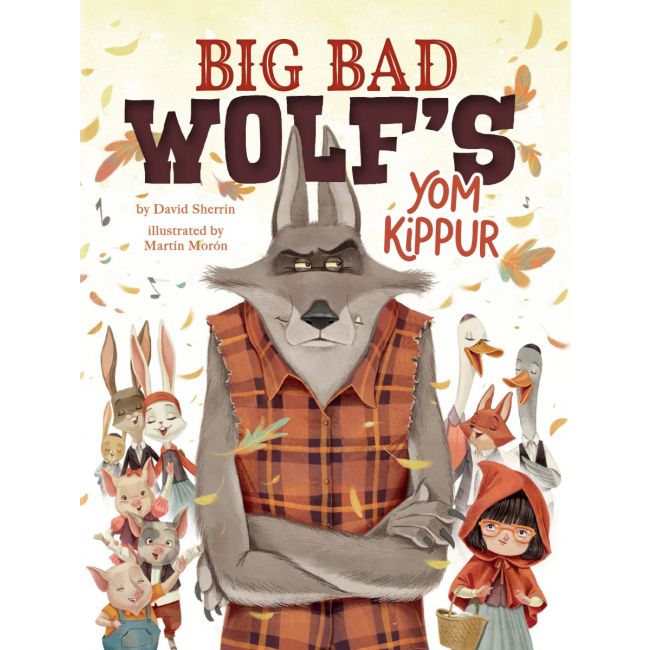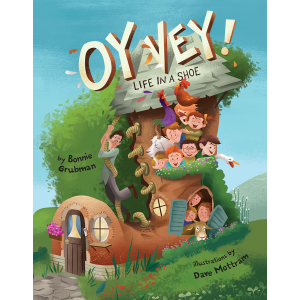Big Bad Wolf's Yom Kippur
With the help of friends and some reflections on apologies, forgiveness, and community during the Jewish holiday of Yom Kippur, even a Big Bad Wolf might find the heart to change his ways.
"This sweet, humorous tale conveys the meaning of this important Jewish holiday in a way that’s understandable for children. Its premise proves it’s easy to err on the side of good; each of us has kindness within, and it’s satisfying to let it show." --Kirkus Reviews
In this fractured fairy tale mash-up that explains the Jewish holiday of Yom Kippur, Bid Bad Wolf struggles to understand whether he has the capacity for change, and in the process discovers friendship among those he once thought of only as tasty snacks.
When Racoon invites the Big Bad Wolf to Yom Kippur services, Wolf agrees to go. While he is there, he hears how everyone can use Yom Kippur as a day to become better and brighter. Wolf’s not so sure…a big bad wolf can’t become good! Can he? Will helping the girl in a red hood, her granny, and the three little pigs show him the way?
It is a regular morning, and Big Bad Wolf is just getting ready for another day full of bad, when something very different happens. Raccoon knocks on his door to apologize for rummaging through his garbage and invites him to synagogue services. What first appears to Wolf as an opportunity for a giant lunch buffet becomes, instead, an opportunity for Wolf to experience a change of heart. Warmly welcomed by the rabbi, who claims anyone can become better and brighter just like the leaves in the forest as they change color in the fall, Wolf, wrapped in a peaceful moment, begins to wonder if he could do the same. He spends the day helping Little Red Riding Hood take care of her sick grandmother (even though he’d rather eat them both) and showing the three little pigs how to make their houses stronger. Despite the new feelings these kindnesses give him, deep down he doesn’t believe a wolf can change, because he keeps making mistakes. But as the day ends, his new friends arrive with a feast to break their Yom Kippur fast and they want to share it with their helper, partner and friend, a Big GOOD Wolf.
Sharp, sly illustrations envelop this gently fractured fairy tale in humor and warmth, while the story includes many details that help explain Yom Kippur practices to young readers as they discover we can all return to our best selves, beginning with kindness and heartfelt apologies.
On the Day of Atonement, the Big Bad Wolf reflects.
It’s Yom Kippur, and the Big Bad Wolf is preparing to be bad. Things start changing at the synagogue, where he concedes a hug feels nice and almost sings along with the others. Hearing the rabbi’s sermon, Wolf wonders if he can become “better and brighter.” After services, Wolf encounters familiar story characters: a red-hooded girl and her grandmother, whom he treats kindly, and a porcine trio to whom he gives sensible home-building advice. What’s happened? Wolf’s worst instincts repeatedly try to surface, but they’re defeated by his much-improved nature, and it becomes clear that the formerly Big Bad Wolf has evolved into a much nicer lupine. That evening, after the holiday is over, the Big Good Wolf is rewarded by his grateful newfound friends. This sweet, humorous tale conveys the meaning of this important Jewish holiday in a way that’s understandable for children. Its premise proves it’s easy to err on the side of good; each of us has kindness within, and it’s satisfying to let it show. The fractured-fairy-tale motif will engage young readers and also makes familiar literary sense, as the Big Bad Wolf, naturally, is the antagonist of both “Little Red Riding Hood” and “The Three Little Pigs.” The illustrations are comical and dynamic; Wolf and all other animal characters are riotously expressive. Bespectacled Little Red and Granny are pale-skinned. (This book was reviewed digitally.)
A solemn holiday is given an appealing, entertaining treatment well suited to young kids. (author’s note about Yom Kippur) (Picture book. 4-8) --Kirkus Reviews

 Reading Guide
Reading Guide 


